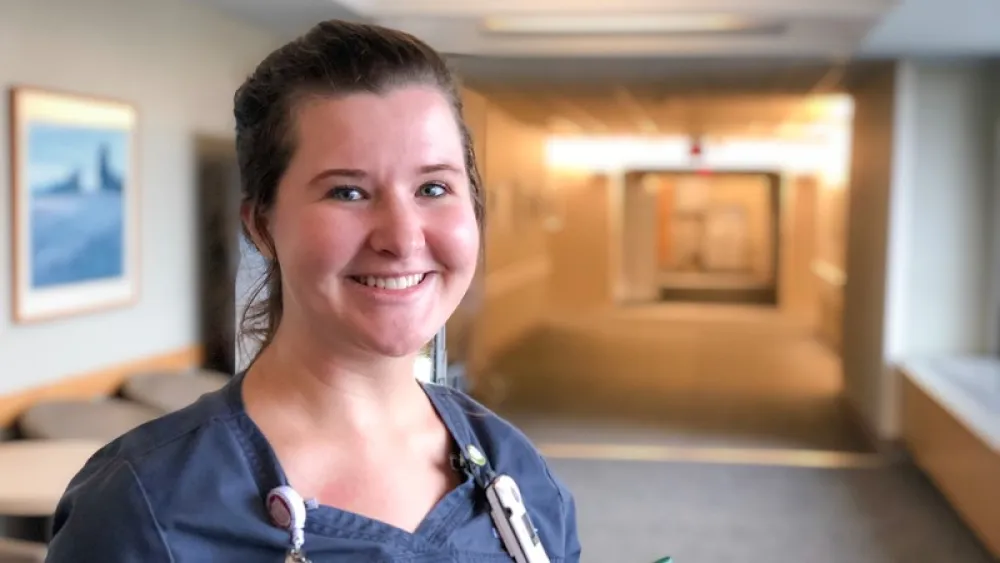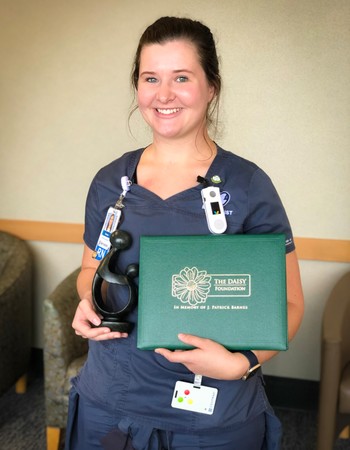Inspiring Stories
With Tears in Her Eyes, Methodist Nurse Helps Patient Enter Final Resting Place
Published: Sept. 25, 2019

It was the Fourth of July.
Chelsea Clarke, BSN, RN, a Methodist Hospital Progressive Care Unit (PCU) nurse, was looking forward to an evening of fun and fireworks following her 12-hour shift.
Toward the beginning of that shift, a man suffering from abdominal pain was brought to the Emergency Department.
“It was found to be ischemic colitis,” Clarke said. “And due to his age, frailty and some comorbidities, he was not a surgical candidate.”
Eventually moved to the PCU, the man, accompanied by his daughter and son-in-law, had his first interaction with Clarke.
“He was just so sweet,” Clarke said. “Despite the way he was feeling, he was so positive and upbeat.”
Comfort care and end-of-life conversations
For whatever reason, the patient’s daughter had a premonition that her father might not survive his hospitalization.
“In fact, she wanted to start having conversations regarding code status and care options early in the day,” Clarke said.
The patient, not quite ready to be a part of those discussions, refused to believe his time was nearing. After all, he had other out-of-state family he still needed to say goodbye to.
“So I helped her with ways we could approach that conversation with him,” Clarke said. “Not to try to make him see our side of it by any means – that’s not what he needed. But to try to make him more comfortable. Assuring him that, ‘Yes, it’s scary, and nobody wants to die, but if that’s going to happen, we’re going to help you through it and make you as comfortable as possible.”
The patient’s health began to decline rapidly. He was transferred to the hospital’s Intensive Care Unit. There, his care team worked feverishly to improve his condition.
Having spent nearly all of her shift by the patient’s side, Clarke still chose to stay late. She continued to coordinate care and helped family members make sense of their loved one’s situation. While she maintained her composure through most of her interactions with the family, the gravity of what they were going through became too much for her to bear.
“We saw tears in her eyes when we found out he might not live,” the family wrote in a letter of appreciation.
Clarke attempted to explain her emotions: “It is so hard to look at somebody and say, ‘OK, this is it.’ There’s so much we can do in medicine, and it’s just hard when there’s …”
Clarke paused in an effort to hold back the same tears her patient’s family described.
“There’s just so many things we can do,” Clarke continued. “And to have to tell a family there’s nothing we can do – it’s painful.”
“He died hours later,” the family wrote, “but she made him feel so cared for the entire time, which was such a blessing to us!”
 Nominated for compassionate care
Nominated for compassionate care
For her unyielding compassion, the patient’s family nominated Clarke for the DAISY Award.
Humbled by the gesture, Clarke was sure to credit her fellow PCU nurses, who provided backup on some of her other patients that day.
“All so I could give the appropriate focus and care to this particular family,” she said.
It takes a village, Clarke said of The Meaning of Care. Everyone has a role. And on that Fourth of July, Clarke knew that hers was to put her own holiday plans aside and focus on what her patient needed most as he entered his final resting place.
“Again, there’s a lot of things we can do,” Clarke said. “But the question should always be, ‘Should we?’ Patients aren’t always in the capacity to make certain decisions or have certain discussions. That’s why it’s important that you take the time to get to know them. It should never come down to what we think they might want, but what they really would want.”
More Resources
- Read about the Progressive Care Unit’s Team DAISY Award in 2015
- Learn more about The DAISY Foundation
- Nominate a Methodist nurse for the DAISY Award today
- Read more inspiring stories about Methodist patients and staff


